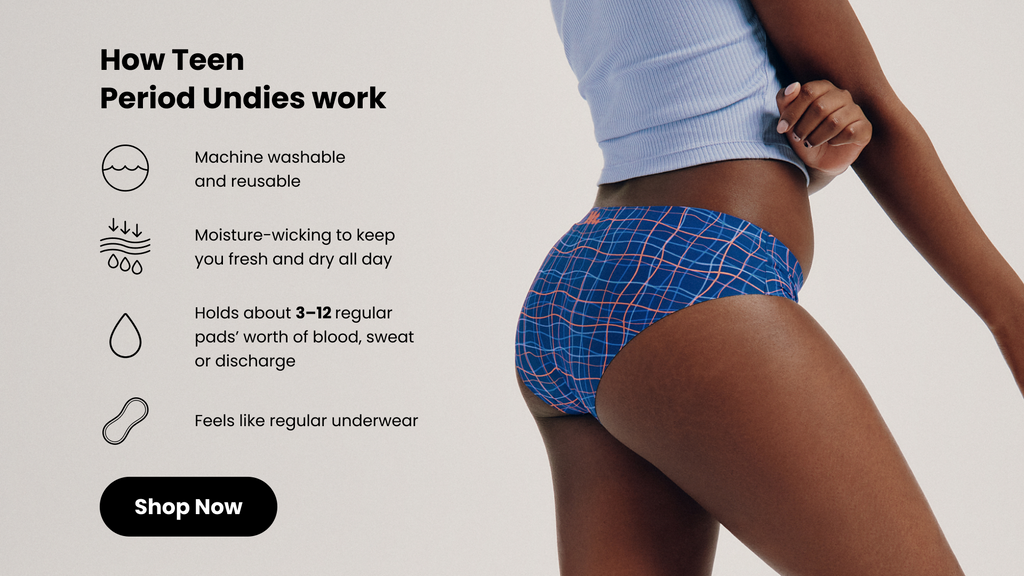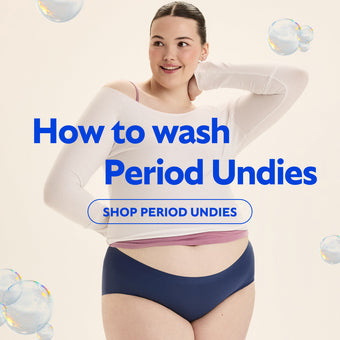Let's talk about the number two thing on your teen's mind during their menstrual cycle. It might surprise you.
Period poops. Many folks who get their menstrual period experience period poops, but nobody seems to be talking about it. Until now!
Your teen might think this type of bowel movement during a menstrual cycle is just a ‘them thing,’ but believe it or not, period poops are as common as cramps, mood swings and breakouts. Yup, that's right. Just because people aren't talking about it on TikTok doesn't mean they aren't filling up their toilet bowls as they scroll.
In fact, this BMC Women's Health study found that at least 28% of people with periods experience diarrhea when they’re menstruating. Holy sh*t, right! (Pun fully intended. We couldn't resist.)
Poop during a menstrual cycle
Period poops are bowel movements that typically happen at the start of a period. They’re usually looser and more frequent than regularly-scheduled poop programming, and also tend to be more foul-smelling. The good news? Changes in the frequency, smell and consistency of bowel movements during a period are super common!
What causes period poops?
Let's all give a round of applause to prostaglandins, the orchestra behind this fine poop production! Prostaglandins are a group of hormone-like compounds in the uterus lining. Right before a period begins, the cells that line the uterus begin to produce more prostaglandins. These hormones cause uterine muscle contractions so the lining can shed each month, AKA produce the period. Whenever someone feels a cramp, that’s a contraction!
In addition to menstrual cramps, acne, mood swings, and other PMS symptoms, prostaglandins can also affect bowel movements. Remember, prostaglandins cause the muscles in your uterus to contract. So, if the body produces extra prostaglandins, they will flow into your bloodstream and have a similar effect on other muscle areas, such as the bowels. The result?
*In Shania Twain's magical voice* I'm inviting you to a party for poo, woo!
A menstrual period can also have the opposite of a laxative effect. Other bowel movement changes, such as constipation, are also common.
Okay, but why the smell?
The hormone progesterone (one of the hormones found in some oral contraceptives AKA birth control pills), is also working hard during your teen's period. It helps regulate their period and rises in levels before they get their period to prepare for conception.
It also amps up hunger and all those sweet, salty and savory cravings that are often high in fat or sugar. These changes in eating habits play a large role in poop changes. The body has a harder time digesting these foods, which leads to a stronger smell and a change in the consistency of bowel movements during the menstrual cycle.
Other gastrointestinal symptoms
Like we said, constipation or diarrhea are totally common bowel movements to have during a menstrual cycle. Additionally, people with irritable bowel syndrome (IBS) may experience increased aggravated gastrointestinal symptoms during their period. For more information on IBS, inflammatory bowel disease and other health conditions, speak with a medical professional.

Can my teen stop period poops from happening?
The same way you can’t stop the motion of the ocean or the sun in the sky, there’s no way to really halt the pooping process. While your teen may just need to let their body take its natural course, here are some tips to help with some of the physical symptoms of period poops:
- Eat more fruits, veggies and whole grains: Eating lots of natural fibre will help keep their digestive system on track. Incorporating more fruits, vegetables and whole grains into meals can help increase fiber intake.
- Reduce foods that can cause irritated gastrointestinal symptoms: When on their period, the only thing they may want to eat is anything deep-fried and covered in chocolate (we get it). But maintaining regular eating habits can be very beneficial. Fried, greasy and sugary foods should be avoided as much as they can during their period to reduce digestive symptoms.
How to manage period poops
If your teen notices their tampon often becomes dislodged during a period poop, they can try eating foods that prevent constipation (the more you push, the easier it is for a tampon to be pushed out).
They can also try to also avoid bearing down unnecessarily. They may also want to switch up their product game and avoid wearing tampons altogether at this stage. Leakproof Underwear is a great alternative! If they're interested in wearing tampons but aren't quite sure where to start, check out our guide on how to insert a tampon for the first time.
While they can't stop the period poops, they can manage their period symptoms! To manage menstrual pain/cramps, we put together this handy dandy guide on how to get rid of period cramps fast.
As for the emotional symptoms related to periods, do what feels right. While exercising on their period can help boost their mood, they may just want to relax and watch Netflix and that's a-okay. They should do what feels right for them at that moment!
Regular bowel movements vs. when they should see a doctor
Period poop is very common and completely normal. However, you should always speak to a doctor if your teen experiences any changes or have concerns about what's going on with their body. If they notice blood in their stool, very painful cramps/abdominal pain, anal pain, or if their symptoms worsen, speak with a medical professional. Their doctor may want to test for conditions such as irritable bowel syndrome and inflammatory bowel disease.






